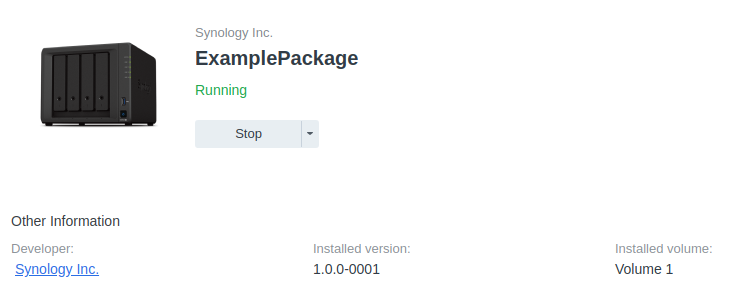Your First Package
Make sure you have prepared the development environment for your NAS.
Download the template package
You can download our template package from https://github.com/SynologyOpenSource/ExamplePackages and place the ExamplePackages/ExamplePackage directory at /toolkit/source/ExamplePackage.
/toolkit/
├── build_env/
│ └── ds.${platform}-${version}/
├── pkgscripts-ng/
│ ├── EnvDeploy
│ └── PkgCreate.py
└── source/
└──ExamplePackage/
├── examplePkg.c
├── INFO.sh
├── Makefile
├── PACKAGE_ICON.PNG
├── PACKAGE_ICON_256.PNG
├── scripts/
│ ├── postinst
│ ├── postuninst
│ ├── postupgrade
│ ├── postreplace
│ ├── preinst
│ ├── preuninst
│ ├── preupgrade
│ ├── prereplace
│ └── start-stop-status
└── SynoBuildConf/
├── depends
├── build
└── install
Configure Build Configs
The steps to build package and pack package are configured under ${project_path}/SynoBuildConf/. You can see three files:
- depends: configure dependencies between projects
- build: configure steps to build package
- install: configure steps to pack package into
.spkfile
This example will echo some messages by a program written in C language, so it is neccessary to compile program in build stage. We apply Makefile in this example to help us doing cross compilation.
We do not concern what you do in build configuration so that it can even do nothing. The build system will just chroot into environment then call the corresponding build, install script according to the commands.
Configure Properties
The package information and its behavior are controlled by INFO.sh which will be translated into INFO file in install.
#!/bin/bash
# INFO.sh
source /pkgscripts/include/pkg_util.sh
package="ExamplePackage"
version="1.0.0000"
os_min_ver="7.0-40000"
displayname="ExamplePackage Package"
description="this is an example package"
arch="$(pkg_get_unified_platform)"
maintainer="Synology Inc."
pkg_dump_info
Configure Lifecycle Behaviour
The package control scripts can be found at ${project_path}/scripts/. You can control the behaviour in each stage such as calling a examplePkg program on package start / stop.
#!/bin/sh
# scripts/start-stop-status
case $1 in
start)
examplePkg "Start"
echo "Hello World" > $SYNOPKG_TEMP_LOGFILE
exit 0
;;
stop)
examplePkg "Stop"
echo "Hello World" > $SYNOPKG_TEMP_LOGFILE
exit 0
;;
status)
exit 0
;;
esac
Write a program and configure its compilation and installation
It is common to bring compiled program into DSM via package. You can just write your program in C and add a Makefile to compile your programs.
// examplePkg.c
#include <sys/sysinfo.h>
#include <syslog.h>
#include <stdio.h>
int main(int argc, char** argv) {
struct sysinfo info;
int ret;
ret = sysinfo(&info);
if (ret != 0) {
syslog(LOG_SYSLOG, "Failed to get info\n");
return -1;
}
syslog(LOG_SYSLOG, "[ExamplePkg] %s sample package ...", argv[1]);
syslog(LOG_SYSLOG, "[ExamplePkg] Total RAM: %u\n", (unsigned int) info.totalram);
syslog(LOG_SYSLOG, "[ExamplePkg] Free RAM: %u\n", (unsigned int) info.freeram);
return 0;
}
# Makefile
include /env.mak
EXEC= examplePkg
OBJS= examplePkg.o
all: $(EXEC)
$(EXEC): $(OBJS)
$(CC) $(CFLAGS) $< -o $@ $(LDFLAGS)
install: $(EXEC)
mkdir -p $(DESTDIR)/usr/bin/
install $< $(DESTDIR)/usr/bin/
clean:
rm -rf *.o $(EXEC)
Any additional files (e.g., compiled program, media resources) should be packed into package.tgz file inside .spk. We provide several script commands to do such operations. In this example, we will pack compiled examplePkg executable via install build script.
# SynoBuildConf/install (partial)
create_package_tgz() {
local firewere_version=
local package_tgz_dir=/tmp/_package_tgz
local binary_dir=$package_tgz_dir/usr/bin
rm -rf $package_tgz_dir && mkdir -p $package_tgz_dir
mkdir -p $binary_dir
cp -av examplePkg $binary_dir
make install DESTDIR="$package_tgz_dir"
pkg_make_package $package_tgz_dir "${PKG_DIR}"
}
Build And Pack The Package
After you have finished preparing the package source code, you can use the following commands to build and pack the package into .spk at /toolkit/result_spk/${package}-${version}/*.spk.
cd /toolkit/pkgscripts-ng/
./PkgCreate.py -v 7.0 -p avoton -c ExamplePackage
/toolkit/
├── pkgscripts-ng/
├── build_env/
│ └── ds.${platform}-${version}
└── result_spk/
└── ${package}-${version}/
└── *.spk
Install And Test The Package
Go to DSM > Package Center > Manual Install then select your .spk file to do installation.

Once you have installed and started the package, you can see its message on UI and log at /var/log/messages.